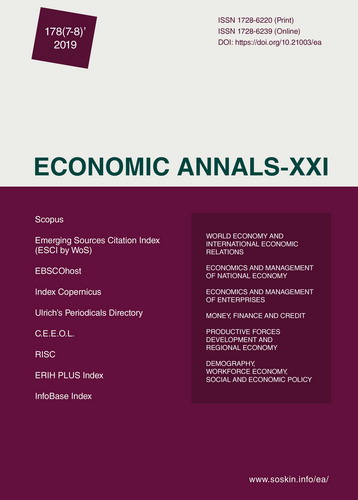The implication of ICT in assessing the relationship between the current account balance and the economic growth in South Africa
The implication of ICT in assessing the relationship between the current account balance and the economic growth in South Africa
Author(s): Emmanuel Innocents Edoun, Genevieve Bakam FotsoSubject(s): ICT Information and Communications Technologies
Published by: Institute of Society Transformation
Keywords: Current Balance; Trade; Balance; Economic Growth; Information and Communication Technology (ICT); South Africa;
Summary/Abstract: For many years, continuous downgrade of the current deficit in South Africa has been a concern for a country that has an open economy and seeks for global positioning. Many authors have researched on this particular topic with an emphasis on common variables that lead to the same results. The current article seeks to highlight a predominant role played by information and communication technology in boosting the current account balance and thus enhance the economic growth in South Africa. Using a digital economic framework, this study considers time series from 2007 to 2016 (the latest full data available at the moment of research), as recent decades have been dominated by digital transformation to approach data analysis. Research findings indicated that 52.93% of GDP is explained by the dependent variables, namely foreign direct investment, ICT trade balance, computer and communications trade balance and the current account balance. This suggests that technological upgrading through digital innovation system, as well as adoption and information infrastructure, is statistically significant in affecting the current account balance and growth performance in South Africa. Data interpretation revealed that deficit on the ICT trade balance generates sustainability of the current account deficit due to a higher rate of imports compared to exports in the field of ICT in South Africa. Since ICT contributes 3.0% to the total of GDP and is a multidisciplinary field that touches all the other sectors, the South African government should restructure exiting trade policies and regulations to promote development of smart technologies. Additionally, the implementation of the sophisticated enterprise resource planning system at the level of businesses and the government should optimise productivity and profitability which are building blocks of the economic growth. However, other factors, such as policy strategies, political and currency stability are not to be neglected when moving towards long-term survival and economic growth in South Africa.
Journal: Економічний часопис - ХХІ
- Issue Year: 178/2019
- Issue No: 07+08
- Page Range: 28-45
- Page Count: 18
- Language: English

